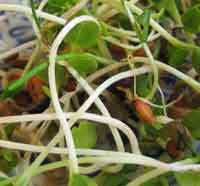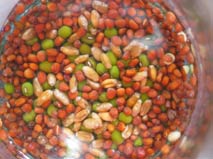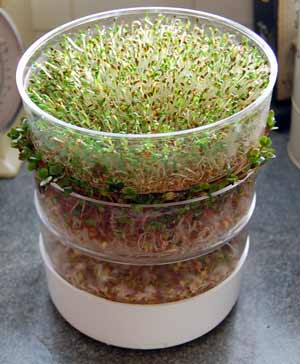Sprouting Seed is an Easy Way to Grow Tasty Organic Food
Sprouting seed for health and taste -
Here's an easy organic addition to your green kitchen!

Picture: Home grown sprouted seeds
Sprouting seed at home is very easy way to supplement your diet with fresh food. The best thing about this is you can do sprouting even if you live in a tiny flat or apartment on the 17th floor!
Sprouting your own foods from seeds and grains is an easy way to obtain some cheap - or even free - food. Now that the "credit crunch" appears to be here to stay many people may find this a valuable way of adding some good nutrition to the family table without straining the budget.
Sprouted seed is extremely nutritious; the starches and fats stored in the seed are used to produce proteins, vitamins and minerals.
While sprouted seeds may not be any richer than other fresh foods as sources of vitamins, there is no doubt that they are an exceptionally good source of enzymes amino acids and phytochemicals. Phytochemicals have been shown to have a role in preventing cancer.
What you need to begin sprouting

All you really need is a largish jar and some suitable seeds. Muslin or cheesecloth is useful - but not essential - to filter the seeds or beans so that they do not drain away with the washing water. If you want to grow sprouts often it's worth investing in a seed sprouting kit: see below for more details of these and their benefits.
Picture, right: sprouting seed just soaking ready to begin
Suitable sprouting seed choices
There is a wide variety of suitable seeds, including alfalfa, fenugreek and broccoli seed. These are all good choices for sprouting if you are new to this easy way of growing food at home. Alfalfa, for example, is both nutritious and tasty and only takes 3 or 4 days to produce acceptable sprouts.
For a fuller list of sprouting seeds and growing instructions please see below.
How to sprout seeds
Pour a handful of seeds into the container – a large wide-necked jar is ideal. Add filtered water at room temperature and leave the seeds to soak for a few hours or overnight.
Next day pour off the excess water from the seeds and refill with fresh water. Give the seeds a light shake or swirl round to rinse them through and then pour off the excess water again.
You can fit a muslin or cheesecloth lid with the aid of an elastic band, or you can just use a kitchen sieve to catch the sprouting seeds and hold them back so that you don’t lose them down the sink.
Just be careful that they don’t break – drain them carefully.
Do this about twice a day for 3 – 7 days, depending upon the seeds used.
The seeds will gradually sprout both roots and fledgling stems. You can experiment with different times so that the seeds are the size you like them best. Most are nicest when they are still quite small and pale. If you expose them to sunlight they will green-up quickly. Or you can keep them pale and succulent by keeping them in a darkish place.
I find it is easiest to keep the sprouting seeds close to the sink and water filter for easy washing.
Plenty of rinsing
The washing process is important. Like any living thing, seedlings give off waste products. They need bathing in fresh water to flush away any build up of such wastes and they need the fresh water to continue growing. You can use the waste water - which is rich in nutrients, as a compost tea for other plants.
If you do forget to rinse them once or twice it’s not usually a problem. Just rinse them extra carefully next time and perhaps add in an extra rinse or two. Pure water, preferably filtered water is best for sprouting seed because it is freer from impurities such as chlorine.
When your sprouted seeds are ready add them to fresh green salad ingredients in sandwiches and stir fries.
Seeds sprouts are naturally organic because you have grown them with nothing other than pure water and a little sunlight. If you want to be rigorously organic, use organic seeds.
Sponsored links
Some suitable seeds to use for sprouting
Here is a list of suitable seeds for sprouting:
Alfalfa
Azuki beans
Barley
Broccoli seed
Buckwheat
Cauliflower - and any other of the brassicas
Fenugreek
Lentils (whole, not split)
Mung beans
Radish
Rice
Rye
Wheat
Be aware that some beans may contain toxins that make them unsuitable for sprouting - unless you cook the resultant sprouts. Kidney beans and buckwheat are two that are probably worth avoiding. Buckwheat contains fagopyrin a toxin which can make your skin over-sensitive to sunlight.
Many beans, including kidney beans and cannellini beans contain phytic acid which can give you digestive upsets. Cooking adequately destroys these toxins.
Other than these exceptions, sprouted seeds are often easier to digest than their unsprouted equivalents. They are also an excellent source of vitamins, minerals and dietary fibre.
Don't eat sprouted seed which has spent too long in the fridge or other storage. Like any stored food, bacterial contamination can arise.
Sponsored links
Using organic seed for sprouting
You might prefer to start with organic sprouting seed as they should produce an even better crop. Organic growing is an earth-friendly way of growing as it involves no chemical-based inputs and should also be less fuel intensive.
Organic seeds for sprouting are available from specialist seed merchants and some health food shops. You can also buy them through Amazon. You should either buy special seed prepared for sprouting, or cultivate your own from your garden.
Don't use commercial seed which has been prepared for sowing. They may have chemical additives to promote growth or deter pests.
Where to buy a seed sprouter and seeds

Sprouting seed for the table is very easy and satisfying and there are plenty of seeds to choose from. You can buy seed for sprouting in most of the bigger garden centres, Amazon and some health food shops. Give it a try!
You can also buy seed sprouting kits which are good because you can sprout several different seeds at the same time, rinsing them all together. Sprouting kits usually come with a built in lid and drainer. They are not expensive and they are very easy to use. You can buy a Family Sprouting Kit at Amazon.
Picture: A multi-layered sprouter kit
In the UK you can buy three-tiered seed sprouters in many wholefood shops such as Holland & Barrett and even some supermarkets. They are very simple to use and make sprouting seeds even more user-friendly. You can just pop the whole thing in the fridge to slow down growth once your seeds are about ready.
Be sure to rinse your sprouted seeds well before you eat (and enjoy) them!
Good books on sprouting
Ann Wigmore's book The Sprouting Book: How to Grow and Use Sprouts to Maximize Your Health and Vitality (Avery Health Guides) is well-regarded as she gives growing charts and recipes as well as a wealth of detail on the incredible health benefits of these simple foods.
Sprouts The Miracle Food: The Complete Guide to Sprouting has lots of good info but the organisation is a bit tricky to follow. Author Steve Meyerowitz knows his stuff - as he produces and sells sprouting equipment and has been using sprouted foods since the 1970s. Good if you like corny puns!
Natural and Organic Foods - Green Kitchen
Greenfootsteps Home - for more easy green living ideas
| Tweet |

| Tweet |

On other pages
Footprints
- an occasional e-zine from Greenfootsteps
If you would like to receive the e-zine, please just sign up below.






New! Comments
Have your say about what you just read! Leave me a comment in the box below.